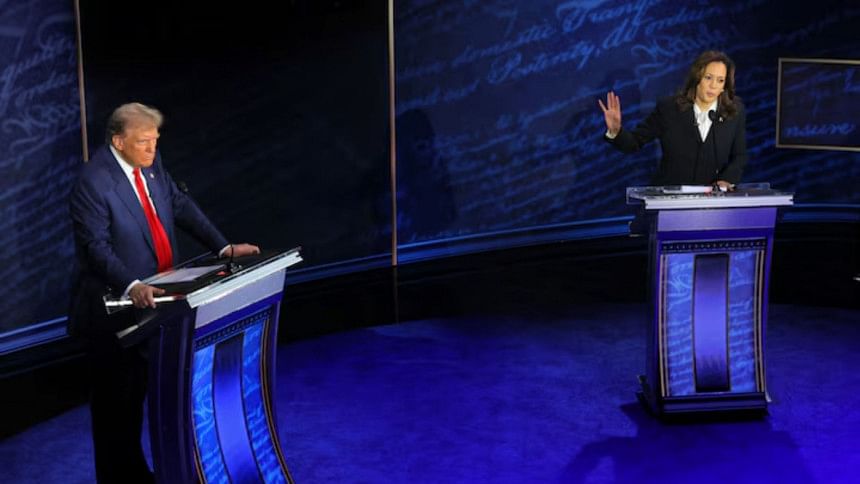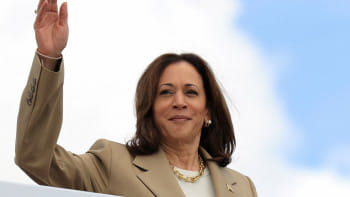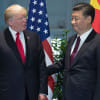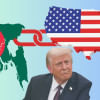Kamala rattles Trump, but how much will it matter?

Democratic Vice-President Kamala Harris locked horns with Republican and former US President Donald Trump in a debate on September 10, peppered by occasional fireworks. Following the debate, a CNN instant poll gave her an almost 2-1 edge.
A note to Democrats: do not uncork the champagne just yet. Just how much the debate performance will matter in the November presidential election is quite another question.
For starters, a huge swathe of the US voting public tends to give these debates a pass, and who can blame them? Substantial parts tend to be soporific, as candidates wriggle out of tough questions and often prefer the comfort of opaque platitudes.
The interesting thing about US political debates is that they are more significant when a participant makes a big mistake.
Take the first televised presidential debate in 1960 between Republican nominee Vice-President Richard Nixon and Democratic candidate Senator John F Kennedy. Kennedy looked impressive on television. Nixon, on the other hand, looked tired, with a five o'clock shadow on his face. TV watchers said Kennedy won the debate, yet radio listeners thought Nixon won. In reality, Kennedy won that election by a whisker. Just this year, US President Joe Biden made such an unholy mess of his debate with Trump that he had to bow out of the presidential race.
Harris and Trump are very different candidates. Harris is more of a typical US candidate, brimming with enthusiasm and ever-ready to regale listeners with the pabulum of US exceptionalism. Lately, she has improved her performance and appeared sharp in the debate. She was nimble in marshalling facts and arguments, though not as quick to call out Trump's lies as her supporters would have liked. Her attempt to needle Trump by talking about folks leaving his rallies was a masterstroke—and it worked.
Trump is something else again. As a political animal, he is sui generis in the US, perhaps in the world. His true calling might well have been to be a carnival barker (unkind critics may say a used-car salesman). For Trump, the goal is to sell—in this case, himself—and like the ultimate salesman that he is, he feels utterly unencumbered by such niceties as facts and truth.
Untethered from reality, Trump's lies came tumbling thick and fast like water gushing out of a fire hydrant: there was no inflation during his presidency, millions of illegal criminals are entering the US raising crime there and lowering crime outside the US, Trump rebuilt the military, crime in the US is going through the roof, etc. To be sure, Harris made false statements too, but they were much fewer and far between.
I saved Trump's most delightful morsel until now. Trump claimed—I kid you not—that undocumented immigrants in a small town in Ohio were catching dogs and cats and eating them. Not only is there no evidence of this, but true to Trumpian form, it is also unconscionably racist. The immigrants are Haitian.
I reacted with shock. Had US political debate reached such a nadir where a candidate can get away with this?
Well, Trump can. Such is Trump's Svengali-like grasp on his supporters that he has created a separate right-wing ecosystem where an alternate reality exists. His outré remarks and conduct are baked into public opinion, and his core supporters are unfazed.
This is why I am not sure how much Kamala Harris will benefit from this debate, electorally speaking, despite her impressive performance. Remember, in 2016, polls suggested former US Secretary of State Hillary Clinton won all debates handily when she ran against Trump. A fat lot of good it did her come November.
Trump's mannerisms are right out of vaudeville, his vocabulary that of an irate high school juvenile delinquent. He says whatever comes to his mind. But analysts dismiss him at their peril. He has an uncanny feel for the pulse of the nation's disaffected.
Take his stance on abortion. He has been twisting himself into a pretzel trying to wriggle out of the abortion debate, because he instinctively senses that the broader public—even many Republicans—are not where the Republican Party and its passionate anti-abortion activists stand on the issue.
On foreign policy, while Harris backs Ukraine unconditionally, I feel Trump's stand on wanting to end the war may resonate with a substantial part of the voting public in the rural hinterland, which is tired of billions of dollars going down another boondoggle.
Harris faces an uphill task also because the US presidential election system favours Republicans. Instead of a popular vote, candidates must win state by state. Most states are overwhelmingly Democratic (California, New York) or Republican (Texas, Louisiana), so the battle comes down to a handful of competitive states.
The city where the debate happened—Philadelphia—is in one such battleground state, Pennsylvania. Analysts say that the road to the White House goes through Pennsylvania. That's a challenge for Democrats. Areas around Philadelphia and Pittsburgh are Democratic, but the rest of the state is rural and deeply conservative.
Americans need to feel comfortable with the president. Analysts often say it's almost as if American voters ask themselves if they would like to have a beer with the candidate.
Are Americans ready to elect an African-South Asian American woman as a president? It is true that once they stunned the world and elected America's first African American president, but there has been a substantial backlash after that.
Most of rural America, I worry, is not ready either to buy Kamala Harris a beer or elect her president. Goodness knows I would like to be proven wrong.
Ashfaque Swapan is a writer and editor based in Atlanta, US.
Views expressed in this article are the author's own.
Follow The Daily Star Opinion on Facebook for the latest opinions, commentaries and analyses by experts and professionals. To contribute your article or letter to The Daily Star Opinion, see our guidelines for submission.

 For all latest news, follow The Daily Star's Google News channel.
For all latest news, follow The Daily Star's Google News channel. 










Comments